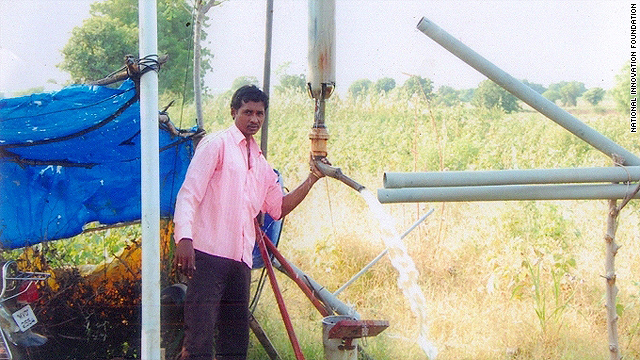India’s inventors seek markets in innovation decade

- India’s databank of inventors is swelling as nation marks 2010s as decade of innovation
- National Innovation Foundation (NIF) has 140,000 entries compared with 10,000 in 2000
- Most inventors on NIF roster are school or college dropouts with little access to markets
- High costs at product-testing labs discourage ordinary, noncorporate inventors
New Delhi, India (CNN) — A young mechanic turns a motorcycle into a tractor while another one uses bio-waste to run a diesel engine.
One farmer finds a herbal cure for animals hit by a breast infection called mastitis. And about 5,000 men have been delivering homemade lunches to 200,000 workers for more than a century in what is hailed as a recession-proof service in a financial hub of Mumbai.
India’s databank of grass roots inventors is swelling as the nation officially marks the 2010s as a decade of innovation.
The country’s National Innovation Foundation (NIF) has 140,000 entries compared with 10,000 when it was set up by the federal government in 2000.
But 10 years later, India acknowledges that bringing its innumerable small-scale experiments to the masses remains a challenge in an economy that is attracting businesses worldwide partly because of high-tech capabilities and a growing middle class.
According to the NIF, most geniuses on its roster are school or college dropouts with little means and access to markets.
So far, the group has filed more than 250 requests for patents, but only five have been accepted in the United States, said Anil Gupta, NIF vice chairman.
India’s spending on innovation, he said, is inadequate in contrast to its mammoth annual budget on general education.
High costs at product-testing laboratories discourage ordinary, noncorporate inventors, Gupta said.
In the past decade, Gupta said his group successfully scouted out innovative talent in 545 of India’s 626 districts.
Yet, there has been no change in federal financial support to his organization since its inception, he said.
In general, India’s top policy-makers are worried about utilization of state funds on public programs amid widespread corruption.
Just as India marked its 60th anniversary as a republic last month, President Pratibha Devisingh Patil said corruption was hindering national objectives.
“Quality of research has to be upgraded and institutions and agencies receiving funds must be made fully accountable,” Patil said in November.
However, global financial institutions underscore that India’s productivity has greater disparities than in China, or even Russia and Mexico.
“The output of the (Indian) economy could increase more than five-fold if all enterprises could achieve national best practices based on knowledge already used in India,” said World Bank economist Mark Dutz while presenting a report on the south Asian nation’s innovation standings in 2007, his institution’s latest on the subject.
It recommended that the country promote research and development efforts for its poor and for its massive informal economy in order to put their existing know-how to mass use.
But experts regret that most Indian innovations have not hit domestic markets, let alone international.
“The real value of an innovation comes when the domain of an application is far distant from the domain of its origin,” Gupta said. “In India, this might still be happening, but at a disappointingly slow pace.”
On Thursday, an institution that promotes small inventions was inundated with telephone calls over the motorcycle-tractor after an article in a local newspaper.
The Gujarat state’s innovations network, GIAN, was unable to advise potential customers how it could enable sale of what is now a patented property.
“There still are so many problems. There’s a problem about finding an old diesel-engine motorcycle. A whole lot of paper work involving transfer of a vehicle to another state is simply not easy,” said Mahesh Patel, a chief innovation manager at GIAN. “Big corporate businesses should come forward and buy these patents.”
Supporters of India’s inventors are struggling for a conducive environment.
“India needs an ecosystem for such innovations. The sooner, the better,” Gupta said.
We recommend
soundoff (4 Comments)
-
GuestIt is not the people of India who have creative inventive spirit, it is humanity.
-
Abhishek420Good stuff! Glad to see that grass roots inventions are finally being taken seriously. Pratibha Patil and the rest of the ministers will obviously, make the right noises and give the exact sound bytes the public wants to hear. I don’t expect ANY help from them. It’s ppl like Dr Anil Gupta (also memb …more
-
Jesteracethere are so many alternate energy sources which are eco-fredinly, but the petroleum lobby around the world is so strong that these things are never heard of
-
GuestKeep going India…we need more local innovation to solve our local needs. We need to stop thinking of a one size fits all policy and become more personal in our inventions. The Indian government needs to step up and provide more incentives and rewards for these inventors. After all that is how the …more
Anil K Gupta




Showing 4 of 4 comments